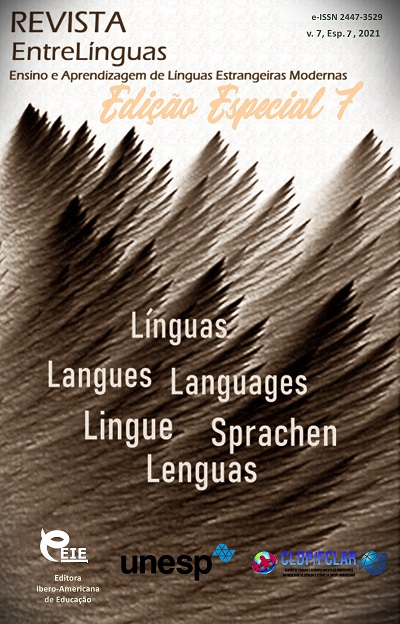Marco “estado emocional en las actividades sociales”: formación y especificaciones de su representación a nivel lenguaje
DOI:
https://doi.org/10.29051/el.v7iesp.7.16294Palabras clave:
Verbo, Emoción, Conceptualización, SemánticaResumen
La investigación propuesta está dedicada a los verbos del estado emocional (agonizar, lamentar, quejarse, anhelar, deplorar, desesperar, dudar, regocijarse, temer, inquietarse, afligirse, lamentar, languidecer, anhelar, maravillarse, deprimirse, llorar, pánico , jadear, arrepentirse, regocijarse, arrepentirse, rebelarse, ponerse de pie, sufrir, enfurruñarse, etc.). Su especificidad está asociada con el mundo interior del sujeto, con su percepción personal y conceptualización de los eventos ambientales. Tal comprensión subjetiva de lo que está sucediendo determina la presencia de una estructura semántica compleja de los verbos en estudio.
Descargas
Citas
BOGUSLAVSKIJ, I. M., ZALIZNJAK, ANNA, A. Research on the semantics of predicates of the internal state”, Voprosy jazykoznanija, Moscow, Russia, no. 1, pp. 164-168. 1995.
CROFT, W. Syntactic categories and grammatical relations: The Cognitive organisation of information, Chicago, London, UK. 1991.
DEM’YANKOV, V. Z. “Сognitive linguistics as a kind of an interpretive approach”, Voprosy jazykoznanija, Moscow, Russia, no. 4, pp. 13-17. 1994.
FILLMORE, C. J. “On the organization of semantic information in the dictionary”, Novoe v zarubezhnoj lingvistike [New in foreign linguistics], Nauka, Moscow, Russia, pp. 23-60. 1983.
HORNBY, A.S. Oxford Advanced Learner’s Dictionary of Current English, Oxford University Press, Oxford, UK. 1982.
JACKENDOFF, R. Semantic Structures. – Patterns in the minds. Language and human nature, Harvester Wheatsheaf, New York, US. 1994.
LAMB, S.M. Pathways of the Brain: The Neurocognitive Basis of Language, (Current Issues in Linguistic Theory, 170.), Amsterdam and Philadelphia: John Benjamins, Netherlands-US. 1999.
MYERS, D.G. Social psychology (11th ed.), McGraw-Hill, Boston, MA, US. 2012.
PETRENKO, V.F. Osnovy Psihosemantiki [Basics of psychosemantics], Izdatel’stvo Moskovskogo universiteta, Moscow, Russia. 1997.
PETROVSKIJ, A.V. IAROSHEVSKII, M.G. Psihologija [General Psychology], Prosveshhenie, Moscow, Russia. 2009.
SHAHOVSKIJ, V.I. Lingvisticheskaya teoriya emocij [Linguistic theory of emotions], Izdatel’stvo VGPU, Volgograd, Russia. 2008.
UFIMTSEVA, A.A. Leksicheskoye znacheniye [Lexical meaning], Nauka, Moscow, Russia. 1986.
Descargas
Publicado
Cómo citar
Número
Sección
Licencia

Esta obra está bajo una licencia internacional Creative Commons Atribución-NoComercial-CompartirIgual 4.0.
Os manuscritos aceitos e publicados são de propriedade da Revista EntreLínguas. Os artigos publicados e as referências citadas na Revista EntreLínguas são de inteira responsabilidade de seus autores.
Transferência de direitos autorais – autorização para publicação
Caso o artigo submetido seja aprovado para publicação, já fica acordado que o(s) autor(es) autoriza(m) a UNESP a reproduzi-lo e publicá-lo na EntreLínguas, entendendo-se os termos “reprodução” e “publicação” conforme definição respectivamente dos incisos VI e I do artigo 5° da Lei 9610/98. O artigo poderá ser acessado pela rede mundial de computadores (Internet), sendo permitidas, a título gratuito, a consulta e a reprodução de exemplar do artigo para uso próprio de quem a consulta, desde que haja a citação ao texto consultado. Essa autorização de publicação 328 EntreLínguas, Araraquara, v. 1, n .2, p. 323-328, jul./dez. 2015 não tem limitação de tempo, ficando a UNESP responsável pela manutenção da identificação do(s) autor(es) do artigo. Os artigos publicados e as referências citadas na Revista EntreLínguas são de inteira responsabilidade de seus autores.











